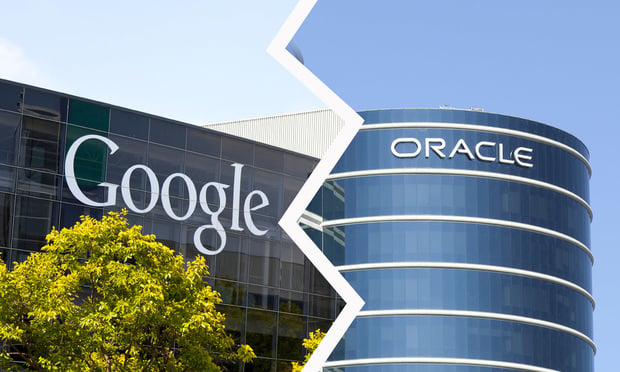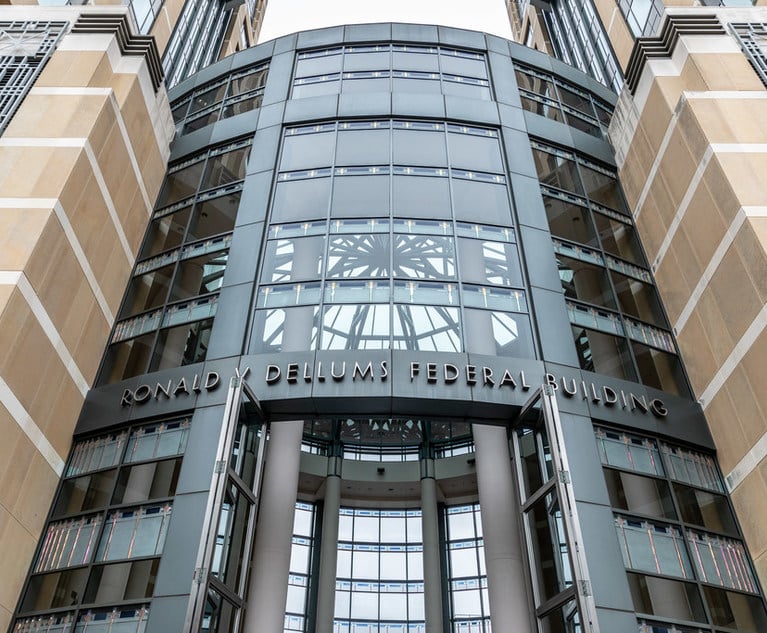 google-oracle
google-oracle Google's Arguments on Copyright Fall Flat at the Supreme Court
Google asks the Supreme Court to walk away from the Founding Fathers' wisdom, congressional intent and the court's own precedent to excuse free-riding on Oracle's copyrighted work to build a massive commercial enterprise.
November 17, 2020 at 12:08 PM
5 minute read
The long-awaited oral argument in Google v. Oracle took place in early October and it was as lively as anticipated. To give a short overview, the facts are unfavorable to Google. The company, seeking to attract developers to its Android mobile operating system, incorporated components of the popular Java platform but refused the license it was offered. Instead, it blatantly copied over 11,000 lines of Oracle's declaring code, as well as the creative structure, sequence and organization of the Java platform. Google lobbed a variety of legal arguments at the court, but a clear majority of the justices seemed unimpressed. Faced with reality, Google attorneys turned to policy arguments that denigrate copyright law and ignore the obvious availability of a range of licensing options it could have taken. Because these arguments are dangerous for the future state of copyright law, it's worth reviewing the context, precedent and particulars that were raised during the oral argument.
First, Google tried to convince the court the code it copied was not protected by copyright. But Congress was clear when it amended the Copyright Act in 1980 that it intended computer programs to be protected as literary works. Google's claim that Oracle's code—indeed any declaring code—is per se not copyrightable is in complete opposition to the statute, which does not carve out any particular code from protection. And the cases cited to support its arguments unsurprisingly fail to do so. For example, Google cited the U.S. Court of Appeals for the First Circuit's 1995 decision in Lotus v. Borland, but that case isn't even about protection of expressive code—it's about menu trees. Even more harmful to Google was its reliance on the U.S. Court of Appeals for the Second Circuit's 1992 decision in Computer Associates v. Altai, where the defendant was caught engaging in literal copying and the court declared that was "copyright infringement." The rest of that decision, and what it is best known for, was about nonliteral copying and thus irrelevant to Google's verbatim copying in the present case.
This content has been archived. It is available through our partners, LexisNexis® and Bloomberg Law.
To view this content, please continue to their sites.
Not a Lexis Subscriber?
Subscribe Now
Not a Bloomberg Law Subscriber?
Subscribe Now
NOT FOR REPRINT
© 2025 ALM Global, LLC, All Rights Reserved. Request academic re-use from www.copyright.com. All other uses, submit a request to [email protected]. For more information visit Asset & Logo Licensing.
You Might Like
View All
Crypto Entrepreneur Claims Justice Department’s Software Crackdown Violates US Constitution
4 minute read
Kraken’s Chief Legal Officer Exits, Eyes Role in Trump Administration
3 minute read
Crypto Exchange’s ‘Meteoric Rise’ Leads to Nationwide Class Action Trend
4 minute read
Trending Stories
- 1Avantia Publicly Announces Agentic AI Platform Ava
- 2Shifting Sands: May a Court Properly Order the Sale of the Marital Residence During a Divorce’s Pendency?
- 3Joint Custody Awards in New York – The Current Rule
- 4Paul Hastings, Recruiting From Davis Polk, Continues Finance Practice Build
- 5Chancery: Common Stock Worthless in 'Jacobson v. Akademos' and Transaction Was Entirely Fair
Who Got The Work
J. Brugh Lower of Gibbons has entered an appearance for industrial equipment supplier Devco Corporation in a pending trademark infringement lawsuit. The suit, accusing the defendant of selling knock-off Graco products, was filed Dec. 18 in New Jersey District Court by Rivkin Radler on behalf of Graco Inc. and Graco Minnesota. The case, assigned to U.S. District Judge Zahid N. Quraishi, is 3:24-cv-11294, Graco Inc. et al v. Devco Corporation.
Who Got The Work
Rebecca Maller-Stein and Kent A. Yalowitz of Arnold & Porter Kaye Scholer have entered their appearances for Hanaco Venture Capital and its executives, Lior Prosor and David Frankel, in a pending securities lawsuit. The action, filed on Dec. 24 in New York Southern District Court by Zell, Aron & Co. on behalf of Goldeneye Advisors, accuses the defendants of negligently and fraudulently managing the plaintiff's $1 million investment. The case, assigned to U.S. District Judge Vernon S. Broderick, is 1:24-cv-09918, Goldeneye Advisors, LLC v. Hanaco Venture Capital, Ltd. et al.
Who Got The Work
Attorneys from A&O Shearman has stepped in as defense counsel for Toronto-Dominion Bank and other defendants in a pending securities class action. The suit, filed Dec. 11 in New York Southern District Court by Bleichmar Fonti & Auld, accuses the defendants of concealing the bank's 'pervasive' deficiencies in regards to its compliance with the Bank Secrecy Act and the quality of its anti-money laundering controls. The case, assigned to U.S. District Judge Arun Subramanian, is 1:24-cv-09445, Gonzalez v. The Toronto-Dominion Bank et al.
Who Got The Work
Crown Castle International, a Pennsylvania company providing shared communications infrastructure, has turned to Luke D. Wolf of Gordon Rees Scully Mansukhani to fend off a pending breach-of-contract lawsuit. The court action, filed Nov. 25 in Michigan Eastern District Court by Hooper Hathaway PC on behalf of The Town Residences LLC, accuses Crown Castle of failing to transfer approximately $30,000 in utility payments from T-Mobile in breach of a roof-top lease and assignment agreement. The case, assigned to U.S. District Judge Susan K. Declercq, is 2:24-cv-13131, The Town Residences LLC v. T-Mobile US, Inc. et al.
Who Got The Work
Wilfred P. Coronato and Daniel M. Schwartz of McCarter & English have stepped in as defense counsel to Electrolux Home Products Inc. in a pending product liability lawsuit. The court action, filed Nov. 26 in New York Eastern District Court by Poulos Lopiccolo PC and Nagel Rice LLP on behalf of David Stern, alleges that the defendant's refrigerators’ drawers and shelving repeatedly break and fall apart within months after purchase. The case, assigned to U.S. District Judge Joan M. Azrack, is 2:24-cv-08204, Stern v. Electrolux Home Products, Inc.










